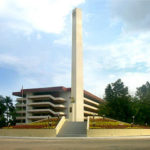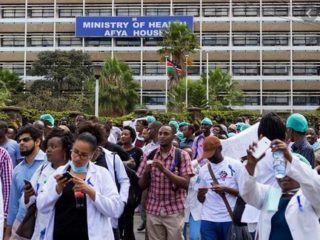Bachelor of Medicine at the University of Nairobi is the most competitive course in Kenya. There are facts one should know before joining the program.
Admission Requirements for the program
Kenyan Government Sponsored Students (Regular Programme)
Admission to the University of Nairobi is by the University Senate through the Public Universities Joint Admissions Board (JAB) whose membership comprises Vice-Chancellors of the Public Universities, Principals of Colleges, Directors of Institutes and Deans of Schools and the academic registrars as secretaries.
The admission is based on the minimum University entry requirements. In addition the applicants should meet the enrolment requirements for the School for the various courses which depend on the KCSE subject cluster as follows:-
Alternative A
- Biology
- Chemistry
- Physics/Mathematics
- English/Kiswahili
Alternative B
- Biological Sciences
- Physical Sciences
- Mathematics
- English/Kiswahili
Application forms are downloadable from elsewhere in this website but can also be obtained from and should be returned to the following:-
Academic Registrar,
University of Nairobi,
P.O. Box 30197, Nairobi, Kenya.
Self Sponsored Students (Module II Programmmes)
Admission to the Module II programmes is by the University Senate, through the school admissions committee. Admission is based on the set minimum requirements for each program.
- K.C.S.E. holders -As in regular program. Additionally, an average of B- (minus) in the 4 cluster subjects shown above provided that no subject in the cluster shall have a score below C+ (plus).
Alternative A
-
- Biology
- Chemistry
- Physics/Mathematics
- English/Kiswahili
Alternative B
-
- Biological Sciences
- Physical Sciences
- Mathematics
- English/Kiswahili
- Advanced Level Holders -A minimum of 2 principal passes; one in Biology and the other in Chemistry and 1 subsidiary pass in either Mathematics or Physics.
-
- Biology
The program is ideal for Kenyans who score A plain in KCSE.Over 1,000 Kenyans apply for the course but less than 200 are admitted. If your KCSE grade is below A plain, it’s better you don’t apply at UoN because you’ll have less than 50% chances of being admitted.
The best thing to do with A- and below if you desperately need the course is to join the parallel program or lesser competitive universities like Mount Kenya University and Kenyatta University.
The duration it takes to complete the course
Bachelor of medicine at UoN takes 6 years to complete. The programme will be divided into two parts here below referred to as Part I and Part II M.Med Programmes. The programmes would be run over a minimum of three years full time course of study by course work, dissertation and examination.
How exams are administered
- Candidates are expected to attend the prescribed courses in their entirety to the satisfaction of the respective departments (in which the respective courses are given) and of the Board of Examiners or the Faculty of Medicine, the College of Health Sciences Academic Board and the Senate of the University of Nairobi.
- No candidate shall be admitted to a University Examination unless he/she has attended all the prescribed courses to the satisfaction of the Faculty and the departments concerned.
- The examinations include written, oral, practical or clinical examinations as determined by the Faculty.
- The examination shall constitute 70 per cent and continuous assessment tests shall constitute 30 per cent of the total final mark in any one subject.
- The pass mark for any one subject shall be 50 per cent except for the common courses where the pass mark shall be 40 per cent.
- The Bachelor of Medicine and Bachelor of Surgery degree is not classified. However the performance in each subject shall be graded as follows:
- 75% and above – Distinction
- 65% – 74% – Credit
- 50% – 64% – Pass
- Except as hereinafter provided for, no candidate shall be regarded as having passed any University examination unless he/she has attained at least one examination pass standard in all subjects for the University examination.
- In any of the University examinations, a candidate who presents himself/ herself for examination for the first time, and who fails with 40 per cent to 49 per cent in only one of the Subjects shall, on the recommendation of the Board of Examiners and the approval of Senate, be permitted to sit supplementary examination on the subject, to be held within three months but not earlier than two months from the date the results are released. If the candidate attains a pass standard in the supplementary examination, he shall be deemed to have passed the respective University examination for the year.
- A candidate who is presenting himself / herself for examinations for the first time and either obtains less than 40 per cent in any one subject, or fails with 40 per cent to 49% (40-49%) in two or more subjects will on recommendation of the Board of Examiners and the approval of Senate be permitted to repeat the year.
- No candidate will be allowed to repeat on academic grounds any one year more than once.
- A candidate who presents himself / herself for examination for the first time and fails with less than 30 per cent in more than one subject will on the recommendation of the Board of Examiners and the approval of Senate be discontinued.
- A candidate who is a repeater and who fails a supplementary examination will on the recommendation of the Board of Examiners and the approval of Senate be discontinued.
- A candidate who satisfies the examiners in the final year or supplementary examinations shall on the recommendation of the Board of Examiners and the approval of Senate be awarded the degree of Bachelor of Medicine and Bachelor of Surgery (M.B.Ch. B.).
Bachelor of Medicine specialization
Clinical Medicine Physicians:
- Anaesthetist – anaesthetics during surgery
- Cardiologist – heart problems and surgery
- Dermatologist – skin problems
- Endocrinologist – glands and blood
- Gastroenterologist – stomach & intestine problems
- Geriatrician – elderly people
- Hepatologist – liver specialist
- Internist – specialist physician
- Nephrologist – kidney specialist
- Neurologist – brain, spinal cord and nerve specialist
- Orthopaedic Surgeon – bones
- Orthodontist – dental surgeon – teeth and jaws
- Ophthalmologist – eye specialist
- Paediatrician – child specialist
- Psychiatrist – mental problems
- Pulmonologist- respiratory system
- Radiation Oncologist – radiation for cancer
- Rheumatologist – rheumatism specialist
Laboratory Medicine Physicians:
- Anatomical Pathologist
- General Pathologist
- Haematological Pathologist
- Medical Biochemist
- Medical Microbiologist
- Neuropathologist
- Pathologist – diagnose disease
Surgeons:
- Cardiovascular & Thoracic Surgeon
- General Surgeon
- Gynaecologist
- Neurosurgeon
- Obstetrician
- Ophthalmologist
- Orthopaedic Surgeon
- Otolaryngologist
- Plastic Surgeon
- Thoracic Surgeon
- Urologist
Bachelor of Medicine Fees Structure for government sponsored students
Fees Structure
These are government sponsored students admitted through Joint Admission Board. They pay directly for the following; however, students are advised to have Kshs 9,000 and Kshs18, 000 to cater for books and catering respectively per year.
| Item | Cost (Kshs.) |
| Tuition | 16,000.00 |
| Computer Laboratory | 3,000.00 |
| Caution money | 2,000.00 |
| Examination | 3,000.00 |
| Medical | 2,000.00 |
| Activity | 1,000.00 |
| Registration | 500.00 |
| Student I/D | 500.00 |
| Student Union | 1,000.00 |
Other Charges
Accommodation Kshs. 7,000.00 Per Year
If you join the course as self-sponsored student, you’ll pay at least Ksh 500,000 every academic year. Bachelor of Medicine is the most expensive course for self-sponsored students.
How long it takes to secure employment after graduating
After graduating, it will take less than a year to get employed. There is huge demand of medical doctors in Kenya.
The salary of a medical doctor in Kenya
Medical doctors earn between Ksh 100,000 and Ksh2 million per month. Hospitals like Kenyatta National Hospital pay doctors average of Ksh250,000 per month. Top private hospital like the Karen Hospital, Mater Hospital, Aga Khan Hospital and The Nairobi Hospital pay experienced doctors more than Ksh400,000 per month.



















